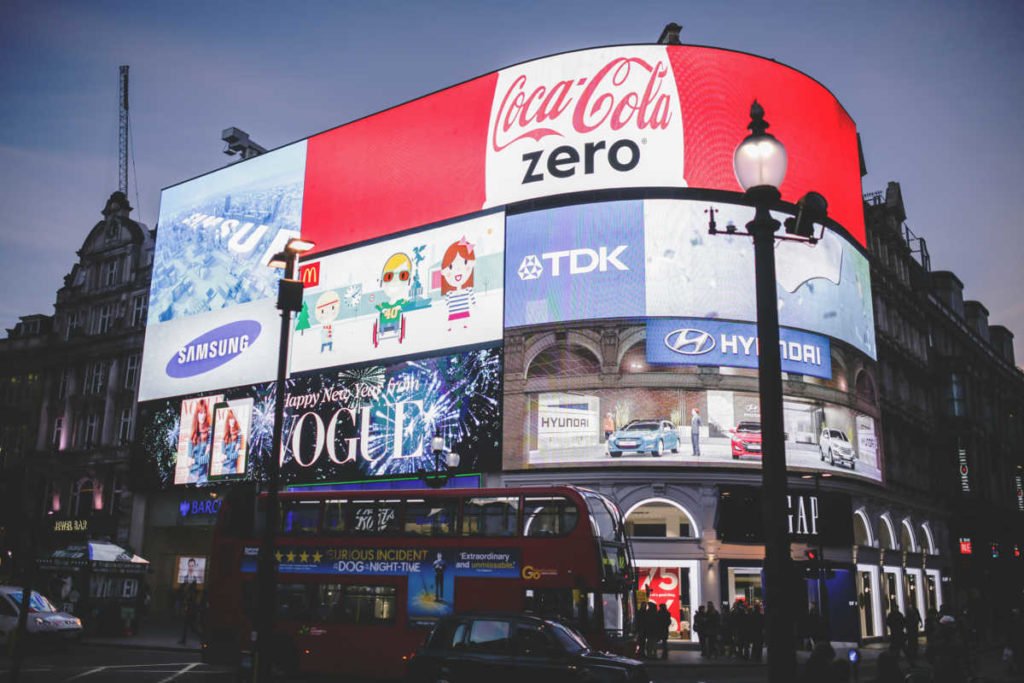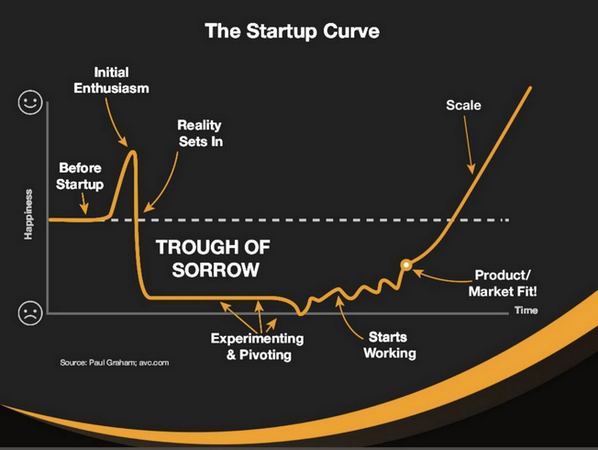
Marketing in startup
How important is it to advertise your product while creating a startup? Do you need to participate in startup events? Or maybe you just have to spend money on advertisements?
Emotions during building a startup are pretty well described on The Startup Curve created (seriocomically) by Paul Graham:

Creating a company is usually accompanied by huge initial enthusiasm which is often pumped by winning some startup competition or appearing in the media (e.g. TechCrunch). If other people write about me and like my product, then it means that I hit the jackpot!
Unfortunately, as the curve states, reality verifies those dreams. The higher the initial enthusiasm, the harder the reality check when emotions subside. A long and very difficult time starts – a period of experimenting and seeking what will appeal to the customers – those who will actually use our product
Marketing is very important but not at the very beginning. What’s far more important is finding a product/market fit, about which I wrote more in the previous entry. In order to find it, you don’t have to appear in the media and startup events. It can even be harmful. These are really time-consuming activities that demand lots of money and energy. In the case of startup competitions, you have to create a presentation, usually go to a different city, face the stress that accompanies it, and then face the emotions that will appear after your performance – it doesn’t even matter whether you win or not. If I lost, does it mean that my product is weak? And if I won, then it means that I am just a step from financial success?
Unfortunately, usually neither of those is true. But those emotions have already showed up and will transfer to the whole team. The way I have been received by the audience can be influenced by many factors, including the ability to act on stage.
Of course it doesn’t mean that competitions are bad. They can bring lots of good things, but we shouldn’t always
focus on them when we are just getting started with our product. We should always think what our startup needs at a certain stage and depending on it – consider appearing on certain events.
If the startup needs money, then we have to think about the prize that we can win, what are the terms and chances of getting the money? If the prize is a trip to some startup compound, then it’s worth considering whether or not it could help us create the product. Or maybe I need connections, and some companies could help me verify my product?
I think that the biggest problem of such events is that people think that the prizes define the product’s value. We have to remember that pitches are held on specific conditions – the startups which are compared are currently on stage, what’s more, assessed by people who usually aren’t target customers of the product and who usually have about 4-5 minutes to form their opinions about what they just heard and saw. It’s a bit like deciding to marry someone after first date. Getting to know your customer is far more important when creating a startup. If engaging in PR makes us stop thinking and working over our product, then it’s probably the wrong way.
Of course it doesn’t mean that promoting your startup in the media or competing in competitions is wrong. It can bring you lots of benefits such as:
- Precious clues and ideas from other people,
- Connections which can help you reach potential customers or investors,
- Or even encouragement to test or ameliorate the product in such way to be able to present it to the audience some day.
Eric Ries, in his book, “The Lean Startup: How Today’s Entrepreneurs Use Continuous Innovation to Create Radically Successful Businesses” writes about what is important during building a startup:
We must learn what customers really want, not what they say they want or what we think they should want.
and:
The ability to learn faster from customers is the essential competitive advantage that startups must possess.
and:
Success is not delivering a feature; success is learning how to solve the customer’s problem.
Learning from your own customers, focusing on what they need is necessary if you want the startup to achieve success.
Media isn’t the target of your product. Of course a situation where your target customers will listen to the media in which you appear can happen, but if the product is just being developed, it’s far easier, cheaper, and faster to get to users directly, whilst avoiding the media.
When the product already exists, then it’s also time to think how to sell it. The Holy Grail of every company is the product so good, that it sells itself. Sadly, there is no such thing. If a person states that it exists, then he either fools himself, or is selling something at the time. Distribution is just as important as the product itself.
Peter Thiel, in his book, “Zero to one” shows the process of selling the product, depending on its price:

CAC stands for Customer Acquisition Cost. The main rule says that the higher the price of the product, the higher the amount of money you need to spend in order to sell it.
The dream of every startup (where CAC is about $1) is viral trade. Facebook and Paypal were working this way. When somebody started using their tools, he started inviting other people, thus creating a network.
Marketing appears when CAC increases to $100. Selling washing powder at wholesale by salesmen walking door-to-door is non-effective and there is no real opportunity for viral trade, so you have to invest in advertisements in the media.
When CAC increases even more, we get into the Dead Zone. For the sake of argument, let’s say that your product costs $1000 and is addressed towards some type of companies. Advertising is too vast, there’s rather little chance that your potential customers will get it. Creating a sales department could be an option, but the revenue can be too low to cover costs. So it’s statistically a zone where trade is the hardest.
It’s easier when CAC is $10 000 or even $100 000. This is the point where the sales department is reasonable. The challenge isn’t making a certain transaction, but how to organize a small team’s work in order to effectively offer a product to a wide range of customers.
Personalized or complex sales show up when CAC is $10 000 000. Usually, sales are handled by the chairman himself, who knows every client personally, and often gets involved into politics (e.g. while trading with the Gov.). Elon Musk made it at SpaceX by negotiating contracts with NASA, and Peter Thiel at the Palantir copartnership, where they make software for big data analytics.
Choosing the sales channel for your product, it’s worth remembering that usually effectiveness is achieved by focusing on only one channel. Buying a couple of advertisements in magazines, employing a few salesmen, and an attempt to introduce a method of viral marketing won’t work. It’s worth finding the channel which has the highest potential and focus on it the most.